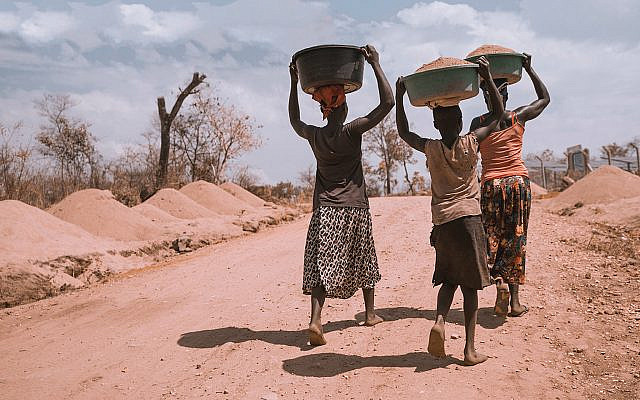· 7 min read
Climate change, unfortunately, is in the news on a daily basis these days. While climate change is expected to affect all countries, the climate crisis will affect some countries more than others. Extreme weather events, such as flooding, prolonged heat waves and droughts will become more frequent and intense in many places. The last months have illustrated this point well, with flooding across the United States, Europe, several countries in Africa like Uganda and Ethiopia, and even in unlikely places like the UAE. Extreme heat and drought conditions along with wildfires have also been seen this summer breaking historic figures.
As natural disasters are wreaking havoc around the world, it was only natural to see that the topic of climate change was one of the central themes of this year’s Kigali Global Dialogue (KGD). The Dialogue, which was hosted by the Observer Research Foundation and the Ministry of Foreign Affairs and International Cooperation, Rwanda, took place earlier this August in Kigali, Rwanda. One of the discussions in the field of climate change which I was grateful to be a part of focused on how to finance all the measures that are required worldwide to adapt to the physical climate hazards that will materialize into natural disasters.
When it comes to climate adaptation, the traditional view is that governments are those responsible to address, finance and implement the adaptation measures in their country. Yet financing adaptation is a challenge as many of the actions required have public benefits rather than private revenue creation, therefore the private sector is reluctant to join the market. One other problem is that it is also difficult to measure the performance and benefits of these adaptation actions and express them in a single metric, whether it be CO2 emissions or US Dollars. With growing adaptation needs, especially in poor and developing countries, which face constrained budgets and debt burdens, innovative ways for financing climate adaptation measures have become a necessity. As Dr. Samson Samuel Ogallah, Commonwealth Climate Finance Adviser, Government of Eswatini explained at the KGD, the amount of resources required annually for Africa alone to address adaptation gaps are over 15 billion USD.
According to Olga Chepelianskaia, Founding Director of UNICITI and International Climate Change Consultant, who participated in a discussion I moderated at the KGD, only 7% of the total climate finance goes to climate change adaptation – 30 billion out of nearly 600 in 2021 – and private sector funding represents 55% of the total. The majority of these private investments go to developed countries. Chepelianskaia explained that most of the developing countries, especially low and low middle income countries, are not considered investment grade and have a big problem accessing international capital markets. Their low creditworthiness discourages the private sector from entering these markets. Chepelianskaia believes that for developing countries, getting access to private sector adaptation finance at required scale is a long but worthy process. According to her experience in supporting Asian countries and cities with climate resilience and climate finance access efforts, the process requires assessing climate vulnerabilities through climate modelling, climate impact modelling and geo-spatial analysis; prioritizing climate interventions; setting up systems to implement them and link them to grant or low interest rate international development finance support. Stabilizing major climate risks along with developing robust implementation systems and raising creditworthiness leads to unlocking private adaptation finance opportunities at scale.
It is in this context and in the wake of the urgency and need, that countries in Africa have begun utilizing innovative financing instruments to fund their adaptation needs. Ogallah, who is one of the most prominent climate finance experts in Africa, added in the discussion that setting the legal backing to climate change action is important to help mobilize finance and several African countries, such as Kenya and Nigeria, have set in place appropriate climate change laws.

Ogallah also pointed out that African countries such as Nigeria, Kenya, Seychelles, Namibia, South Africa have joined a long list of countries in the world that have issued green bonds to address climate change adaptation interventions. Debt swaps are another way to finance adaptation in Africa. Countries such as Seychelles is already implementing this instrument in mobilizing resources for climate actions and the Kingdom of Eswatini, Mozambique and other African countries are exploring how to engage with this instrument for undertaking climate actions. These debt swaps allow countries to deal with both climate and debt problems at the same time by permitting the debtor country to make payments in local currency to finance domestic climate projects instead of continuing to make external debt payments in a foreign currency. With the support from the Commonwealth Secretariat, the Kingdom of Eswatini has also developed its Private Sector Engagement Strategy for NDC/climate Actions. This allows for the effective participation of the private sector in climate interventions in the country. The country has also conducted its Climate Public Expenditure and Institutional Review (CPEIR), all these are aimed at enhancing climate actions in the Kingdom.
According to Ogallah, there are also some financing initiatives and mechanisms at the Continental level that are gaining momentum, including the Adaptation Benefit Mechanism (ABM) which is being promoted by the Africa Development Bank and countries like Côte d’Ivoire, Kenya, the Kingdom of Eswatini and Uganda. The ABM enables countries to utilize Article 6.8 of the 2015 Paris Agreement on non-market mechanisms. As stated previously one of the problems with adaptation measures is that their benefits are hard to quantify. The purpose of the ABM is to certify the different benefits of adaptation activities through verified certificates issued by reputable international organizations in hope that these will guarantee the credibility of the adaptation activities and increase their attractiveness to potential investors or lenders.
It is interesting to see how low-income and vulnerable countries in Africa have developed and utilized innovative financing mechanisms for climate change adaptation, while Israel has not yet introduced any of the financial instruments listed above. In fact, in general, Israel’s climate financing mostly rests on the national budget, government grants and government guaranteed loans. Even concessional loans for climate mitigation measures are not that common. Mostly entities such as the Ogen Group, a not-for-profit organization, which provides both interest-free and low-interest loans or the Agency for Small and Medium Businesses at the Ministry of Economy offer concessional loans, which can be used for climate related uses.
It would be interesting to conduct a study on why Israel over the years has not pursued different and diverse climate financing mechanisms to fund climate change interventions. One hypothesis, which I raised in the panel discussion at the KGD, might be that only when there is a true sense of urgency, that is when veracious action is taken. According to this hypothesis, till now, Israel and probably other countries as well have not reached a sense of urgency to adapt to climate change. For this reason, they have not treated climate change as an existential threat, even though it is usually less expensive and more efficient to prepare for crises in advance.
In the past, Israel was faced with a severe and chronic water shortage, which required investing billions of ILS to bridge the gap between the growing demand for potable water and water scarcity. With the use of water conservation technologies, sustainable water management, wastewater treatment and desalination of sea water, today Israel is at the forefront of water technology and water resilience. According to Mekorot, Israel’s National Water Company, Israel is planning a mega project that will pump desalinated water from the Mediterranean Sea and send it across the country to the Kinneret Lake when required. Such actions are considered one type of adaptation measures and they illustrate that when needed it is possible in Israel to achieve (sectoral) climate resilience.

In the context of Africa, the effects of climate change are today considered an existential risk which exacerbates the other problems faced by African countries regardless, such as food security, poverty conflicts and health issues. Africa has no choice but to find ways to adapt to climate change and address the different bottlenecks, one of which is in the field of financing adaptation. I guess, Israel is not yet there. Let us hope that instead of reaching the crisis and then reacting too little too late, we can learn from the experience of other nations and prepare ourselves in advance to the immense adaptation challenges climate change is inflicting upon us.
This article is also published by The Times of Israel. Illuminem Voices is a democratic space presenting the thoughts and opinions of leading Sustainability & Energy writers, their opinions do not necessarily represent those of illuminem.






